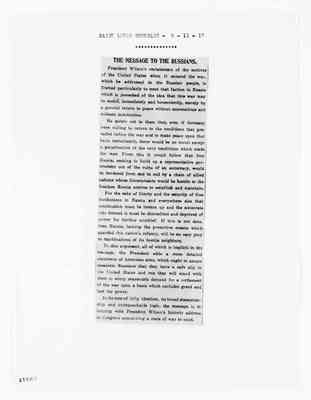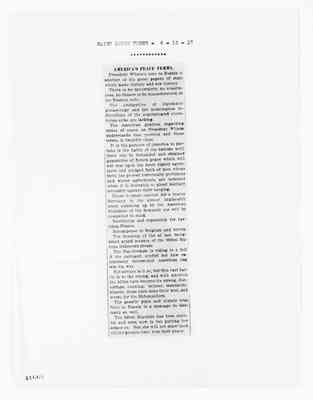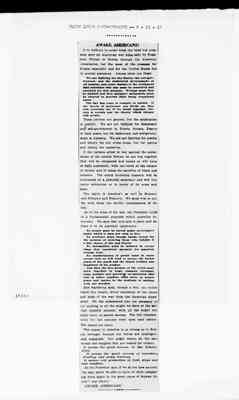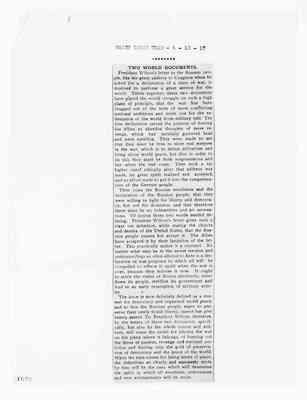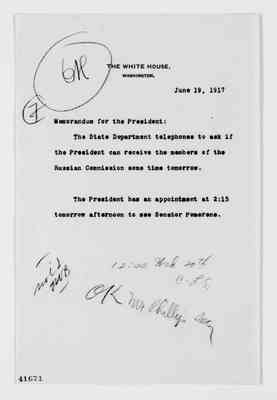Pages
1007
SAINT LOUIS REPUBLIC - 6- 11- 17
THE MESSAGE TO THE RUSSIANS.
President Wilson's restatement of the motives of the United States when it entered the war, which he addressed to the Russian people, is framed particularly to meet that faction in Russia which is possessed of the idea that this war may be ended, immediately and benevolently, merely by a general return to peace without annexations and without indemnities.
He points out to them that, even if Germany were willing to return to the conditions that prevailed before the war and to make peace upon that basis immediately, there would be no result except a perpetuation of the very conditions which made the war. From this it would follow that free Russia, seeking to build up a representative government out of the ruins of an autocracy, would be bordered from end to end by a chain of allied nations whose Governments would be hostile to the freedom Russia aspires to establish and maintain.
For the sake of liberty and the security of free institutions in Russia and everywhere else that combination must be broken up and the autocrats who formed it must be discredited and deprived of power for further mischief. If this is not done, then Russia, lacking the protective oceans which guarded this nation's infancy, will be an easy prey to machinations of its hostile neighbors.
To this argument, all of which is implicit in the message, the President adds a more detailed statement of American aims, which ought to assure idealistic Russians that they have a safe ally in the United States and one that will stand with them in every reasonable demand for a settlement of the war upon a basis which excludes greed and lust for power.
In its tone of lofty idealism, its broad statesmanship and unimpeachable logic, the message is in keeping with President Wilson's historic address to Congress announcing a state of war to exist.
41667
1008
SAINT LOUIS TIMES - 6 - 12- 17
AMERICA'S PEACE TERMS
President Wilson's note to Russia is another of his great papers of state which make history and are history.
There is no uncertainty, no evasiveness, no chance to be misunderstood, in the Russian note.
The ambiguities of diplomatic phraseology and the meaningless indirections of the sophisticated rhetorician alike are lacking.
The American position regarding terms of peace, as President Wilson understands that position and those terms, is limpidly clear.
It is the purpose of America to partake in the battle of the nations until there can be demanded and obtained guaranties of future peace which will not rest upon the mere signed agreement and pledged faith of men whose faith has proved historically perfidious and whose agreements are unbound when it is desirable to plead military necessity against their keeping.
There is small comfort for a beaten Germany in the almost implacably stern summing up by the American President of the demands she will be compelled to yield.
Restitution and reparation for ravished France.
Recompense to Belgium and Servia
The blocking of the at last recognized grand menace of the Mittel Europa iridescent dream.
The Pan-German is riding to a fall if the outraged, scoffed but now relentlessly determined American can win his way.
Not always is it so, but this vast battle is to the strong, and with America the Allies have become the strong. Subterfuge, cunning, bribery, mendacity, bluster, these have done their best, and worst, for the Hohenzollern.
The greatly plain and plainly true Note to Russia is a message to Germany as well.
The Great Republic has been slothful and even now is but putting her armor on. But she will not draw back till the peoples have won their peace.
41668
1009
SAINT LOUIS POST-DISPATCH -- 6- 11- 17
AWAKE, AMERICANS! It is difficult to select from the brief but pregnant note on American war aims sent by President Wilson to Russia through the American commission, but the meat of the message for Russia especially and for the United States lies in several sentences. Among them are these:
We are fighting for the liberty, tbe self-government, and the undictated development of all peoples, and every feature of the settlement that concludes this war must be conceived and executed for that purpose. Wrongs must first be righted and then adequate safeguards must be created to prevent their being committed again.
The day has come to conquer or submit. If the forces of autocracy can divide us, they will overcome us; if we stand together, victory is certain and the liberty which victory will secure.
These phrases are general, but the application is specific. We are not fighting for democracy and self-government in Russia, Britain, France or Italy alone, but for democracy and self-government in America. We are not fighting for justice and liberty for our allies alone, but for justice and liberty for ourselves.
If the nations allied in war against the autocracies of the central Powers do not win together they will be conquered and bound or will have to fight separately, with one-tenth of the chance of victory and 10 times the sacrifice of blood and treasure. The world including America will be dominated by a powerful autocracy and will live under subjection or in terror of its arms and aims.
The battle is America's as well be Russia's and Britain's and France's. We must win or suffer with them the direful consequences of defeat.
As to the aims of the war, the President holds to a fundamental principle which underlies democracy. He says that principle is plain and defines it in its practical application:
No people must be forced under sovereignty under which it does not wish to live.
No territory must change hands except for the purpose of securing those who inhabit it a fair chance of life and liberty.
No indemnities must be insisted on except those that constitute payment for manifest wrongs done.
No readjustments of power must be made except such as will tend to secure the future peace of the world and the future welfare and happiness of its peoples.
And then the free peoples of the world must draw together in some common covenant, some genuine and practical co-operation that will is effect combine their force to secure peace and justice in the dealings of nations with one another.
The wayfaring man, though a fool, can understand this simple, direct statement of the issues and aims of the war from the American standpoint. He can understand also the necessity of our putting in all the might we have at the earliest possible moment, with all the might our allies have, to assure success. The full responstbility for the outcome rests upon each nation. The stakes are equal.
The appeal to America is as strong as to Russia, stronger because our forces are intelligent and organized. Our might means all the men money and supplies that are needed for victory.
It means the quick success of the Liberty Loan.
It means the quick success of recruiting drafting and army training.
It means vast production of food, ships and war supplies.
As the President says, If we do not now succeed, "we may never be able to unite or show conquering force again in the great cause of human liberty"— our liberty.
AWAKE, AMERICANS!
1010
SAINT LOUIS STAR - 6 - 12- 17 . TWO WORLD DOCUMENTS.
President Wilson's letter to the Russian people, like his great address to Congress when he asked for a declaration of a state of war, is destined to perform a great service for the world. Taken together, these two documents have placed the world struggle on such a high plane of principle, that the war has been dragged out of the mire of mere conflicting national ambitions and made one for the redemption of the world from military rule. The first declaration served the purpose of forcing the Allies to abandon thoughts of mere revenge, which had naturally gathered head and were rankling. They were made to see that they must be true to their real purpose in the war, which is to defeat militarism and bring about world peace, but that in order to do this they must be both magnanimous and fair when the end came. They took a far higher stand ethically after that address was made, its great spirit realized and accepted, and an effort made to get it into the comprehension of the German people
Then came the Russian revolution and the declaration of the Russian people, that they were willing to fight for liberty and democracy, but not for dominion, and that therefore there must be no indemnities and no annexations. Of course those two words needed defining. President Wilson's letter gives such a clear cut definition, while stating the object and desires of the United States, that the Russian people cannot but accept it. The Allies have accepted it by their laudation of the letter. This practically makes it a contract. No matter what may be in the secret treaties and understandings so often alluded to, here is a declaration of war purposes to which all will be compelled to adhere in spirit when the war is over, because they indorse it now. It ought to settle the status of Russia absolutely, sober down its people, stabilize its government and lead to an early resumption of military activity
The issue is now definitely defined as a contest for democracy and organized world peace, and to this the Russian people, eager to preserve their newly found liberty, cannot but give hearty assent. To President Wilson, therefore, by the means of these two documents specifically, but also by his whole course and attitude, will come the credit for placing the war on the plane where it belongs, of burning out the dross of passion, revenge and national ambition and leaving only the gold of preservation of democracy and the peace of the world. When the time comes for fixing terms of peace, the definitions so clearly and succinctly made by him will be the ones which will determine the spirit in which all exactions, concessions and new arrangements will be made.
1670
1011
THE WHITE HOUSE. [GH] WASHINGTON.
June 19. 1917
(F) Memorandum for the President: The State Department telephones to ask if the President can receive the members of the Russian Commission some time tommorrow.
The President has an appointment at 2:15 tomorrow afternoon to see Senator Pomerone.
notd jwb
OK Mr Phillip sec 12:30 Wed 20th C. L. S.
41671
